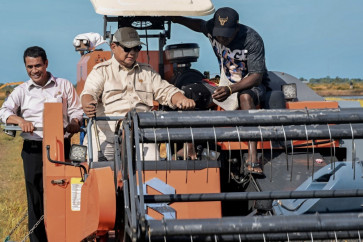Popular Reads
Top Results
Can't find what you're looking for?
View all search resultsPopular Reads
Top Results
Can't find what you're looking for?
View all search resultsEquality for peacekeepers starts at home: MIKTA
Gender equality: Representatives from Mexico, Indonesia, South Korea, Turkey and Australia prepare for a panel discussion on women and peacekeeping at the Double Tree Hilton in Jakarta on Thursday
Change text size
Gift Premium Articles
to Anyone
G
ender equality: Representatives from Mexico, Indonesia, South Korea, Turkey and Australia prepare for a panel discussion on women and peacekeeping at the Double Tree Hilton in Jakarta on Thursday. The panelists are (from left to second right) Group Capt. Deanne Gibbon from Australia, Lt. Col. Yeni Torres Salinas from Mexico, police chief Guluzar Gunduz from Turkey and Eun Ha-chang from South Korea. Anita Nirody (right), the United Nations’ resident coordinator for Indonesia, moderated the discussion.(JP/Michael Johansen)
Countries that want to send more women as peacekeepers on United Nations missions must first enhance female roles in their own police and military.
That was one of the conclusions from a MIKTA panel discussion on women and peacekeeping held in Jakarta on Thursday called “Breaking the Ceiling, Keeping the Peace” that involved representatives from all five member states: Mexico, Indonesia, South Korea, Turkey and Australia.
“You can’t send more women on security operations unless you have more women to send,” said panelist Group Capt. Deanne Gibbon of the Royal Australian Air Force.
Another panelist, Eun Ha-chung, from the Korean Women’s Development Institute, agreed.
“You can only go as far as your domestic level of gender equality,” she said. “We are achieving gender equality within the South Korean military, but we still have a long way to go.”
Gibbon said the effort required preparation. “You don’t know what the barriers and challenges are unless you do the research,” she said. “You can guess, but you won’t know.”
“It is important for MIKTA to work together to find solutions to overcome the barriers to women participating in security forces and especially peacekeeping,” said Grata Endah Werdaningtyas, the panelist from the Indonesian Foreign Ministry, adding that women had to take great risks at home and abroad.
“If the UN wants to increase the numbers of women peacekeepers it should do the research. How can they contribute to peacekeeping if their own safety is being threatened? You have to be brave to break the ceiling.”
Discussion moderator Anita Nirody, the UN’s resident coordinator for Indonesia, agreed.
“The link with development is so important,” she said, referring to a comment about community improvement.
“We cannot talk about the issue of women in peacekeeping without talking about gender equality in society. Women need to feel safe and secure and have conditions of service that balance the many aspects of their lives.”
Grata said governmental policies based on gender stereotypes worked against the goal of sending more female police or military on peacekeeping missions, such as the need for wives to get letters of permission from their husbands before being posted overseas.
“Why do not all male peacekeepers need permission from their wives?” Grata asked. “It’s their family, too.”
Gibbon said the Australian military had been flexible enough to allow her to remain close to home when her children were still small, without hurting her career.
“Women are reluctant to leave their families for a year, but women are less reluctant to leave for 12 weeks or six months,” she said.
Gibbon, who served as a peacekeeper in Afghanistan, said the research approach also worked in host countries.
“I was told many Afghan women wanted to join the police force, but not the army,” she said. “I asked why and I learned they did want to join, but they didn’t want to leave the area and their families.”
All speakers agreed on the need for more female peacekeepers.
“The impact of women on peacekeeping is different than that of men,” said Nirody. “Women bring different abilities.”
First of all, they said, women in uniform were more readily accepted and trusted by civilian women, many of whom had bad experiences with men in uniform.
Also, women could be stationed at checkpoints to conduct body searches on passing women.
Female peacekeepers could also act as positive role models for local girls and women.
In addition, female peacekeepers lessen the occurrence of sexual assaults on civilians.
“Mexico is committed to the eradication of sexual violence in armed conflicts globally,” said Lt. Col. Yeni Torres Salinas from the Mexican Ministry of Defense. “That includes abuse committed by UN personnel in the field.”
Finally, Deputy Foreign Minister AM Fachir offered one overriding reason for increasing the numbers of female peacekeepers: “I believe peacekeeping is too important to be left to men alone.”










